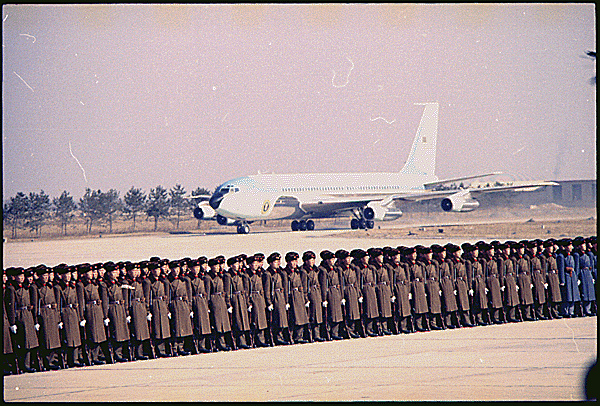 Based on what they read in the national press or hear the talking heads on TV say, Australians could be forgiven for thinking that the Americans and Chinese are totally at loggerheads. We keep getting told at Australia has to choose between the two. And, to be fair, there are China Hawks in Washington who seem to regard the Chinese with the deepest suspicion, and China’s state controlled press frequently invokes American efforts to thwart Chinese interests. In fact, the situation is far more nuanced than those views would tend to suggest. Seen over a very long period, there is an American view of China that is much more sympathetic, and there is no shortage of American thinkers rooting for a Chinese success story in the twenty-first century.
Based on what they read in the national press or hear the talking heads on TV say, Australians could be forgiven for thinking that the Americans and Chinese are totally at loggerheads. We keep getting told at Australia has to choose between the two. And, to be fair, there are China Hawks in Washington who seem to regard the Chinese with the deepest suspicion, and China’s state controlled press frequently invokes American efforts to thwart Chinese interests. In fact, the situation is far more nuanced than those views would tend to suggest. Seen over a very long period, there is an American view of China that is much more sympathetic, and there is no shortage of American thinkers rooting for a Chinese success story in the twenty-first century.
Americans have a resilient hope in China, and they feel a special rapport with the Chinese. The origins of this trait lie in Christian missionaries being the first Americans to live in China, reinforced in the period of the Open Door Notes, when Americans had superior motives, they believed, in upholding Chinese sovereignty in the face of European colonialism. Canberra’s first-ever diplomat based in China, Keith Waller saw the syndrome in Chongqing during World War II: ‘There was a romantic side to Roosevelt’s attitude to the Chinese stemming, I suppose, from the renunciation of the Boxer indemnity.’ Waller’s skeptical Australian eye watched the missionaries in Chongqing: ‘They used to send [to mission headquarters in New York] regular and pretty glowing reports suggesting that with a little more effort the great nation of China would become Christian… this was undoubtedly a major factor in the American tenderness towards China.’
The persistent hope is indeed remarkable. The 1898–1901 Boxer Rebellion shot down US hopes for a cosmopolitan China; a realisation dawned that China, after all, was different from the US Tiananmen 1989 was even worse than the Boxers, this time the villain was not Chinese culture, but Leninist dictatorship. Yet neither upheaval nor others in between cancelled American’s hope toward the Chinese.
Fuelling the hope is unconscious alignment of American values with universal values, allowing Americans to believe China needs what the US offers. It needed the gospel preached by American Protestant missionaries from the early 19th century. It needed American educational expertise and facilities from the late 19th century to advance its lagging society. Certainly Chiang and Mao needed US help to beat back Japan’s invasion in the 1930s and 1940s. Chiang needed a reluctant US to help against Mao’s assault in the late 1940s. Tibet, an unwilling part of the PRC, felt it needed the US to help protect its religion and culture from Beijing. Endangered by the Soviet Union in the 1970s, China needed the USA as a balance. Departing from Maoism during the 1980s, the Chinese needed American capital, know-how, and markets.
Throughout this span of history, the American side was the masterful player, the presumed source for China’s requirements. The US was mostly willing and able to help. Has the need and capacity abated? Considerably. But atavistically it exists in diffused form. Today American technology, sports, and popular culture are lapped up by Chinese. Steve Jobs, Lebron James, and Lady Gaga are ‘needed’ by young urban Chinese. If the ‘special rapport’ is substantially in the American imagination, an indirect ‘rapport’ does come from the unwitting American impact on Chinese individuals. Seldom, however, does all this affect Beijing’s policy toward the US.
In truth American feelings about China are not only a matter of ‘soft power,’ but a function of geopolitics. A great naval and air power, the US also possesses a huge landmass and looks with fascination at distant China, the continental centrepiece of Asia. For Americans the Pacific Ocean affords China an aura and sometimes an illusion. Neither is shared by Japanese, Russians and others much closer, who act and react toward China but seldom dream about it.
Australians generally resist this American psychology. On leaving Washington in February 1972, Nixon compared his visit to China with his countrymen’s voyage into space. At a refueling stop in Guam he said to the crowd: ‘Join me in this prayer, that with this trip to China a new day may begin for the whole world.’ No such religious or cosmic imagery on China policy came from Whitlam when I accompanied him to Beijing in 1971, or has come from any Australian leader (unless it be Hawke) since. Nor, for multiple reasons is Australia likely to demonise China as occasionally has happened with the US.
Ross Terrill of Harvard’s Centre for Chinese Studies is a visiting international senior fellow at ASPI. Image courtesy of Flickr user The US National Archives.

